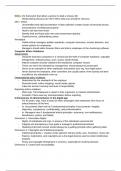Ethics- the framework that allows a person to lead a virtuous life
- Morals (being virtuous) are NOT ethics (why you should be virtuous)
MIS + Ethics
- Uncontrolled and rapid acceleration of data collection creates issues of personal privacy
and protection of intellectual property
- Hard to see fact from fiction
- Identity theft and fraud (wire-wire and ransomware attacks)
- Cryptocurrency, cyberbullying, piracy
Workplace
- Visible ethical managers publish standards, computer instruction, monitor behavior, and
review policies for employees
- Managers should utilize browser filters and inform employees of the monitoring software
Computer Ethics Violations
Illegal activity
- Using the business computers in a criminal act like theft of computer hardware, copyright
infringement, software piracy, pron, scams, bomb threats,
- federal computer security violations like distributive computer viruses
- These can never be tolerated by management, should always be prosecuted
- Serve as an example for other employees and protect your org. from legal action
- Never dismiss the employee, other coworkers are usually aware of the activity and tend
to publicize any attempted cover-up
Organizational policy violations
- Determined by the standards of the employer
- Personal email, online shopping, social media, games
- Take into account seniority and level of responsibility
Reporting ethics violations
- Most orgs. Tell employees to report to their supervisor or network administrator
- Consider if there was any misinterpretation before reporting
5 Dimensions of ethical behavior in the digital age
- For 60 years, orgs. have a board of ethics (managers and employees who focus on
ethical interests of the firm)
- Ie. Accountants often look at 5 fundamental principles of accountants- integrity,
objectivity, competence, confidentiality, and professionalism
- Ie. Managers have 5 fundamental ethical principles- autonomy, non-malfeasance,
beneficence, justice, and fidelity
Dimension 1: Information Rights
- Rights of individuals and orgs. to privacy of the individual’s personal info
- Integrity and transparency must guide a manager’s professional behavior
- Obtaining informed consent should always be a guiding principle when gathering data
Dimension 2: Copyrights and Intellectual property
- Intellectual property = creative works (artwork, literary works, pics, inventions, music etc)
- Patents, trademarks, and copyrights are a few legal devices used to protect intellectual
property
- Piracy and copyright infringement is common, especially for small businesses
Dimension 3: Control and Accountability
, - How individuals or corporations can be held accountable in case of violations of privacy
or intellectual property rights
- Whack a mole phenomenon- where one site is taken down and another one is
immediately opened
Dimension 4: Establishing Standards
- Who has the right to set standards of individuals' privacy rights on the Internet?
- USSC has ruled setting legal standards on the Internet unconstitutional
- Social media consumes at least 15% of all users on the Internet
- Managers should go over guidelines regarding social media and how it can be used to
promote the firm
Dimension 5: Quality of Life
- Right to freedom of speech or right to not be harmed by others?
- Many resolutions to conflicts like these are weak compromises
- Ie. having a 21+ website. approved by one court but dismissed by another (result is
weak verification)
- Managers should ensure employees understand importance of high ethical standards on
the internet (less wasted time, less misuse, less viruses)
Making Responsible Decisions
- Leaders must act ethically- if they are unethical it gives permission to employees to do
the same
- Aggressive Wells Fargo manager encouraged raises for opening new client accounts
- In result, employees acted unethically and fraud to open new accounts for clients without
their knowledge
- Cost Wells Fargo 3 billion, loss of reputation
An Ethical Dilemma Analysis
- When a manager faces a dilemma in the digital age, there are 5 steps that should be
taken
- Get all pertinent facts, determine who is affected, search for precedents, list
options, and deal with consequences of the decision
- Get the facts
- Conduct research, make sure you know as much info as possible
- Often you will find there are hidden agendas regarding items that were not
immediately apparent
- Who is affected?
- Who will be impacted by the decision, privacy or property rights of any individuals
or corporations?
- Rights and feelings of others must be regarded
- Search for precedents
- Does the org. provide any guidelines such as policies, a code of ethics, or
mission statement with guidance?
- What have other managers done in the past?
- List the options
- Write down a list of all options and potential outcomes
- Choosing not to make a decision is also making a decision




